#Lam Ching Ying
Text
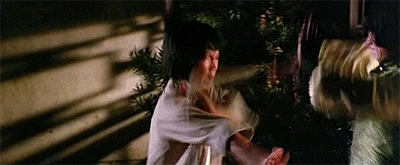
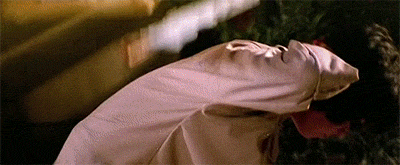

Yuen Biao, Lam Ching Ying - The Magnificant Butcher (1979)
#yuen biao#元彪#lam ching ying#林正英#the magnificant butcher#林世榮#sammo hung#hong kong cinema#hong kong action#martial arts cinema#action choreography
33 notes
·
View notes
Text
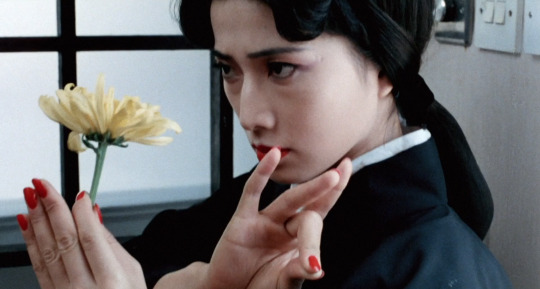

Magic Cop 1990
50 notes
·
View notes
Text

1981’s “The Prodigal Son” aka “Pull No Punches” 🇭🇰
Biao Yuen
Frankie Chan
Lam Ching Ying
Directed by Sammo Hung
#sammo hung#lam Ching Ying#yuen biao#chinese martial arts#Chinese kung fu#kung fu#kung fu cinema#Chinese action cinema#martial arts#martial arts action#hong kong#hong kong action#hong kong cinema#hong Kong action cinema#1981#1980s movies
0 notes
Text

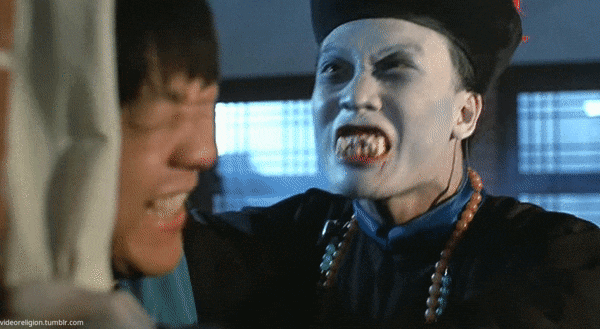


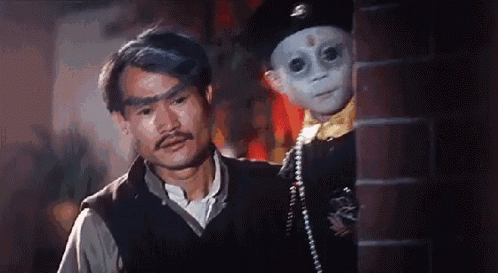

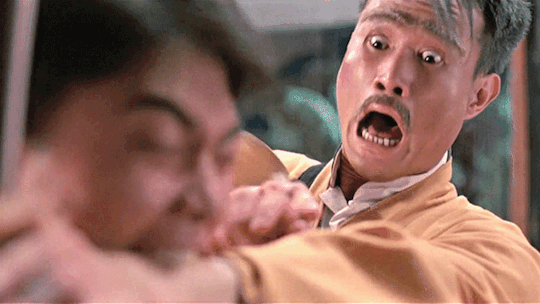

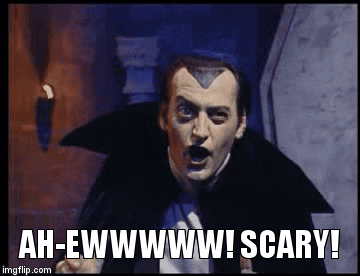
Mr. Vampire (1985)
Okay, the little vampire in the 5th gif isn't from Mr. Vampire, but instead from one of the many sequels. The interaction between him and Lam Ching-ying's Master Kau (aka One-Eyebrow Priest) is just too cute. Plus, the little guy doesn't speak; he squeaks.
Mr. Vampire didn't invent the jianshi (Chinese hopping vampires) film genre, but it sure as heck popularized it. The series, and its many imitators (most of which starred Lam as well), was hugely successful. Lam was even acting in a television series based on Mr. Vampire when, tragically, he passed away from liver cancer.
Golden Harvest, the Chinese studio behind the Mr. Vampire series, attempted to remake the film for the American market under the title Demon Hunters, but ceased filming not long after production started.
Since then Michelle Yeoh's production company has teased that it wants to make its own American market remake. However, it's been over 20 years since they made that announcement, and now that Madame Yeoh is an Oscar ™ winner she's probably too busy to do it. However, a remake with her in Lam's role as the Taoist exorcist would be fantastic! Especially if she could leverage a reunion of her old Hong Kong buddies - Jackie Chan, Sammy Hung, Yuen Wan, Donnie Yen, et. al. - to appear in it as well.
A guy can dream, can't he?
In the meantime, if you've never seen Mr. Vampire or any of its sequels, you need to remedy that RIGHT NOW! They are loads of fun, and I think you'll really enjoy them.
#Monster Chiller Horror Theatre#Mr. Vampire#Ricky Hui#Chin Siu-ho#Anthony Chan#Lam Ching-ying#Pauline Wong Siu-fung#Count Floyd#Second City#SCTV#vampires#jianshi#Chinese hopping vampires#Hallowe'en#Halloween
15 notes
·
View notes
Photo
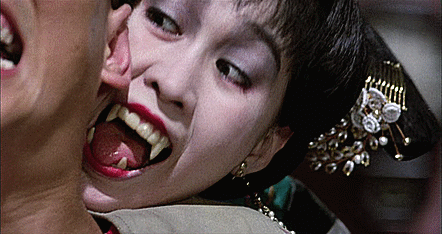
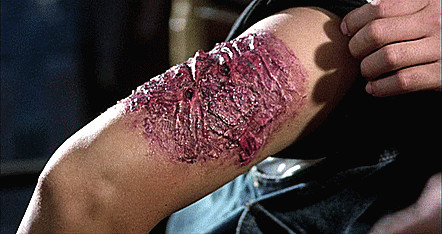
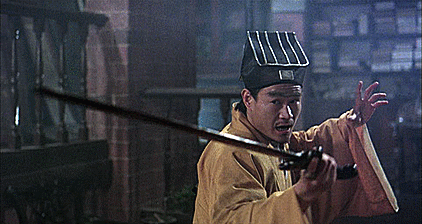
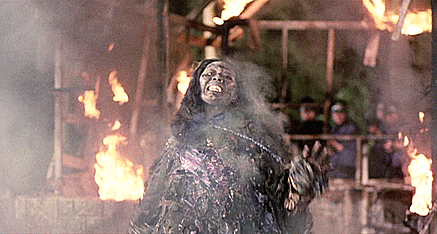

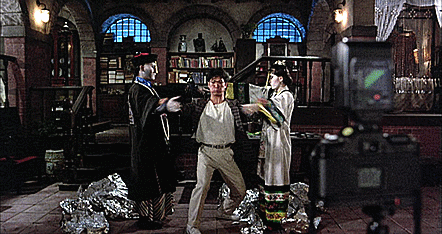

Mr. Vampire II (1986)
#Mr. Vampire II#ricky lau#Biao Yuen#Ching-Ying Lam#Moon Lee#Wing-Cheung Cheung#Pauline Yuk-Wan Wong#Kin-Wai Ho#hong kong cinema#80s action movies#filmedit#80s movies#80s film#80s#Geung see ga zuk
59 notes
·
View notes
Text

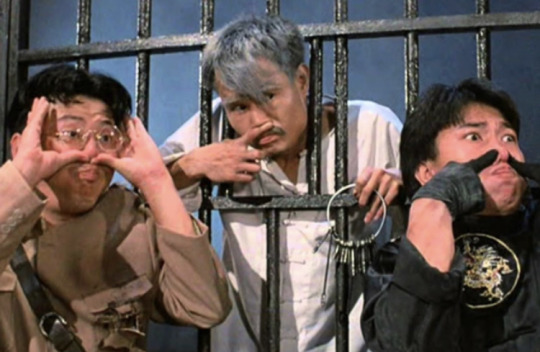

Nothing but respect for *my* daozhang.
Lam Ching-Ying as Master Kau, the original and the best, gone but not forgotten.
youtube
8 notes
·
View notes
Text
EVIL Has the Right to Remain Dead! "Magic Cop" reviewed! (88 Films / Blu-ray)
No Two-Bit Magician In ‘Magic Cop” on Blu-ray!
Hong Kong cops are confounded by a chaotic drug bust when learning that their female suspect, who had managed to overpower an entire unit of male officers and even take a bullet ambling deadpan into the streets, had died 7 days prior. An outlying officer, and practicing Taoist, Uncle Feng is called to Hong Kong to not only quickly solve the…
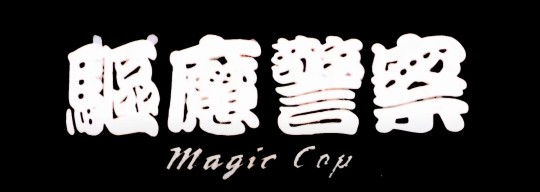
View On WordPress
#88 Films#Big Trouble in Little China#blu-ray#Centipede HOrror#Chi-Leung Shum#Ching-Ying Lam#City Cops#comedy horror#Frank Djeng#Frankie CHi-Leung Chan#Ghost for Sale#Hard Boiled#Hong Kong#horror#john Woo#Kan-Cheung Tsang#Kiu-Wai Miu#Kung-Fu Hustle#Magic Cop#Marc Walkow#Media Asia Film#Mei-Wah Wong#Michiko Nishwaki#Millifame Productions Limited#Movie Impact Limited#Mr. Vampire#MVD#MVDVisual#Return of the Demon#Ricky Lau
0 notes
Text
Preview- Hopping Mad: The Mr. Vampire Sequels
After the huge success of Mr. Vampire, Hong Kong audiences were desperate for more vampire-hopping action and the films’ producers were more than happy to oblige. A steady stream of jiangshi content was produced over the following years, and presented here are 4 of these classic titles from stunning new restorations.
In Mr Vampire II (aka Vampire Family) an archaeologist and his students…

View On WordPress
0 notes
Text
MXTX Interview with Risa Wataya for Subaru Magazine P.7
Which creative works influence you:
Risa: Please tell us which creative works influence you.
Moxiang: Professor Jin Yong's wuxia novels (*)! Professor Jin Yong is my number one teacher in the craft of writing. His skill in crafting wuxia stories, his artistic palate, the sheer intellectual depth and philosophical complexity of his stories and characters. Professor Jin Yong's wuxia novels have a profound and immeasurable influence on all modern Asian creative professionals.
(*: the legendary late professor Jin Yong. He's not as well-known in English-speaking spheres due to the complexity of his works being very difficult to translate to languages outside of the Sino-Tibetan language family. But in Asia, he's a literature titan. He's comparable to Tolkien in that he laid the foundation and codified the tropes of wuxia as a modern genre (alongside Gu Long and Liang Yusheng) and brought about the first and subsequent wuxia waves, and that there's also university courses and entire research field on Jin-Yong-ology. However, he's a much more prolific writer, having produced 15 wuxia series, among which 14 are of comparable length or longer than the Lord of the Rings and The Hobbit combined.
It would be no lie to say there's not a single creative professional in Asia that is not influenced by Jin Yong in some way, shape, or form.
One of Jin Yong's trademarks is the overwhelming, often obsessive, sometimes destructive love that his characters exhibit. There's not one work of his that is not threaded through with larger-than-life romance, not just among the protagonists, but also among the villain characters. The trend of modern Chinese literature, especially wuxia and xianxia, to portray larger-than-life romance can be traced directly to Jin Yong's influence.
Interestingly, he's also credited as having accidentally created the proto icon of danmei as a genre.
I'm sorry. I'm so excited I want to cry. Professor Jin Yong is also my first teacher in the craft of writing. It turns out we all step in the footsteps of the giant, huh, Moxiang?)
I also watch a lot of 90s Hongkong movies. Do you know "Shaolin Soccer'?
Risa: I do know!
Moxiang: Stephen Chow's comedy movies, Tsui Hark's wuxia, and fantasy horror movies. Lam Ching-ying's walking corpse movies. I love all of these.
Risa: That's closer to jiangshi (*) than modern zombies.
(*: a type of Chinese walking corpse. The name literally translates to stiff corpse. Jiangshi is typically translated into Chinese hopping vampire in English due to their similarity to Western vampires. They are the dead that comes back to life. They suck yang energy from living people. They fear the smell of garlic. Etc... Jiangshi has real-life basis in an extinct profession in China: the corpse walker, i.e., people who made a living out of 'walking' corpses back to their home provinces in times of war and chaos. Corpse walkers are mentioned in Liao Yiwu's historical book 'The Corpse Walker')
Moxiang: That's right. That's right. A hopping jiangshi. I watch a lot of such movies. Some movies are from before I was born, such as 'A Chinese Ghost Story' and 'Sword Man' (*). I have watched them more than ten times! If I meet someone who has never watched those movies before, I will enthusiastically drag them along while saying, "Let's watch them together!" My novel bears obvious and immense influence from these movies... For example, the funny scenes in my story are very close to the atmosphere of comedy scenes from Hongkong cinema. Or the walking corpses in my story. My inspiration came from these undead corpses. In the novel, I mentioned using glutinous rice as a cure for corpse powder. This knowledge came from the movie "Professor Jiangshi" (named 'Mr. Vampire' in English in the Wikipedia).
(*: Both of these movies are Tsui Hark's movies and are counted among the top 100 best movies of Asian cinema. They are known for their fantasy elements, eroticism, and homoeroticism. These movies came from a time where Asian cinema was pushing boundaries left, right, and center. Swordsman and its spin-off were adapted from Professor Jin Yong's The Smiling Proud Wander. The very same work in which he accidentally created the proto-icon of danmei. I wrote an essay about this as part of danmei history last year. I will make a separate post after this.)
Risa: To be honest, when I reached the part where glutinous rice was used to cure corpse powder in 'Mo Dao Zu Shi,' I was moved.
Moxiang: Ah? A Japanese author saw the glutinous rice scene in my novel and linked it to jiangshi movies... That is so surprising!
Risa: When I was young, I watched a lot of jiangshi movies. I love them!
Moxiang: I feel increasingly close to Ms. Risa now. As for other foreign literature, Emily Bronte's 'Wuthering Heights' greatly influences me. When I read it during elementary school, I was shaking from excitement. Perhaps because of the influence of Wuthering Heights, that whenever I see complex, intertwining love-hate situations, I feel such joy and nostalgia in my heart.
There's also my favorite childhood mangaka Rumiko Takahashi! This kind of light-hearted, rowdy atmosphere where characters argue and rib each other is so cute! I especially like 'Ranma 1/2'. I think it's the best comedy manga. Other than that, 'Inuyasha' can only be described by the word romantic. Romantic! To this day, Kikyo is still a goddess in my heart.
Risa: Although 'Ranma 1/2' is a work that features China in it, what do Chinese people think about it?
Moxiang: The first thought that comes to my head is 'charming!' After that is probably fond familiarity. This work (Ranma 1/2) features many Chinese elements. I feel that the distance between our hearts is lessened.
To be Continued (The next part will be the last)
Translator: Sythe / NPD Khanh
308 notes
·
View notes
Photo
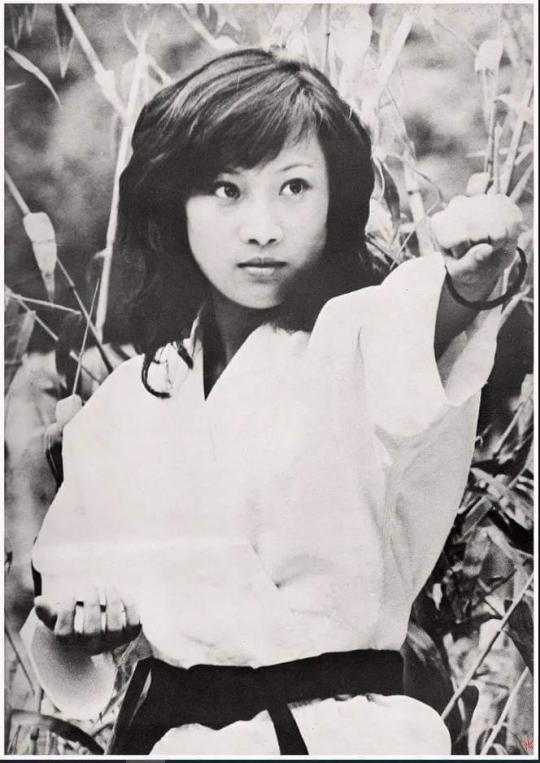
Happy Birthday to Angela Mao!
Of all the people who ever called themselves “the female Bruce Lee,” Angela Mao was the only one who ever seemed worthy of that stupendously grandiose title. After all, even though she played Bruce Lee’s sister in Enter the Dragon, people forget, she was a leading lady in martial arts films before and after that role; that role didn’t make her, it was just a coronation. In fact, her stardom predates Bruce Lee’s. In fact, calling her the female Bruce Lee might be underselling her, as her films actually outperformed Bruce Lee’s in 1972 and 1973.
Even though it was the studio that would later discover Jackie Chan and Bruce Lee (as well as the place where Sammo Hung first directed and produced a film), Golden Harvest’s first movie (made with money laundered from the Chinese Mafia by noted gangster associate Raymond Chow) was The Angry River in 1970 a full two years before Bruce. It was built as a star vehicle around Angela Mao, who they correctly figured would be the next Cheng Pei Pei. In fact, Angry River seems to be the odd movie out in Angela Mao’s filmography, in that she gets a love story, is asked to cry on camera (Angela Mao is notoriously made of stone). It’s seldom seen today, maybe because it’s a Cheng Pei Pei movie that just happens to star Angela Mao. It took her next two films to discover her real identity and screen persona.
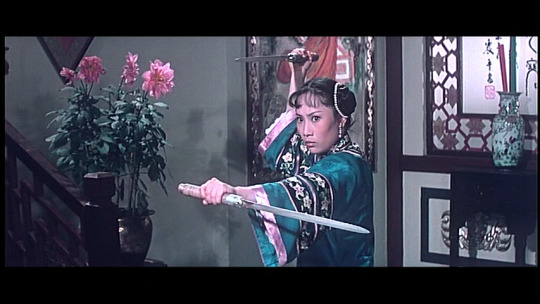
Her two biggest movies were two similar ones released and made closely together in time, a one-two punch: Hapkido, and When Taekwondo Strikes, both 1930s period pieces set in Occupied Korea, Hong Kong/South Korea co-productions (back when very little entertainment was made in South Korea), both of which essentially have the exact same plot: the main character who is a Chinese girl and martial artist caught up in the resistance to the hated Japanese occupiers of Korea, and their gi-wearing karate school enforcers, who are actually spies running operations for the occupation.
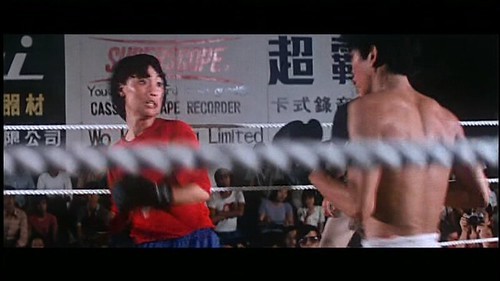
These movies set the basic formula for Angela’s Mao’s films: she was a lady tiger who was fed up and wasn’t going to take it anymore, an all-Chinese girl who represented the presumed Chinese audience, and who got in exotic and beautiful Asian locations. In The Tournament, Angela Mao went to Thailand to challenge the Thai Kickboxers at their own game (the first Thai Boxing themed movie of course, is Cheng Cheh’s Duel of the Fists, which predates it by mere months). In The Himalayan, she was caught among the intrigues of the Himalayan tribes, which is easily her most beautiful movie with the most stunning locations, actually filmed in Tibet and Nepal. Blood Oath, another from her Golden Period, was essentially a remake of Lady Snowblood, and she kills people with scorpions. Finally, Lady Whirlwind gave her her nickname, much like how Madonna is known as the Material Girl. I can’t recommend that one, as it’s one of a few movies she splits top billing.

Angela Mao was who she was because her friends loved her. Yes, of course, she was good friends with Bruce Lee (stories disagree on how “close” and “friendly” they were, if you get my meaning), but it is just amazing to see, in the backgrounds of her movies, stuntmen turned action movie stars like Sammo Hung, Lam Ching-Ying (Mr. Vampire himself) and yes, even Jackie Chan. Blink and you miss him, arguably the most famous human being in Asia, and there he is, a nobody knockaround stuntman right behind Angela Mao, the star.

Angela Mao very seldom got a love story or boy-friend in her movies. really. She seemed so ferocious, all glares, that it was like the tiger spirit inside of her scared off any love. Either way, nearly all martial arts actresses can be ranked on a continuum of “vulnerability” to “ferociousness,” with some, like Kara Hui, leaning toward vulnerability, Queen Boxer Judy Lee somewhere in the middle, and Angela Mao at the far, ferocious end. No surprise, there: Angela Mao had a glare that could stop a charging rhino, one that her children said meant “they were in trouble.”

I’m delighted to say that Angela Mao is alive and well. But that was not clear until very recently. You see, at the height of her fame, Angela Mao vanished mysteriously. No one knows what happened to her...until 2016, when the New York Times, researching the fate of the lost Queen of the Kung Fu Movie, reported she was alive and well and running a Chinese restaurant in Queens, hiding in plain sight.

484 notes
·
View notes
Text
Kaoru and Hong Kong Movies

X ( Long post!! )
It's been a while, but I found that Kaoru mentioned a lot of classic Hong Kong movies in this tweet.
These are the movies I used to watch when I was a kid, and I never thought I'd ever hear them from Kaoru one day, so I want to give a brief introduction to these movies. 😀
01. スパルタンX (Spartan X)
繁體中文:快餐車 / English: Wheels on Meals
Wheels on Meals is a 1984 Hong Kong martial arts action comedy film written and directed by Sammo Hung (洪金寶), with action choreographed by Jackie Chan (成龍). The film stars Jackie Chan (成龍), Sammo Hung (洪金寶), Yuen Biao (元彪), Lola Forner, Benny Urquidez and José Sancho.
In 1984, it was adapted into the video game Spartan X (released as Kung-Fu Master internationally).
The final fight between Jackie Chan and Benny Urquidez
🎥 Best Fight Scene 👇
youtube
02. 五福星 (ごふくせい)
繁體中文:奇謀妙計五福星 / English: Winners and Sinners (or 5 Lucky Stars)
Winners and Sinners is a 1983 Hong Kong action comedy film written and directed by Sammo Hung (洪金寶), who also starred in the film. The film co-stars Jackie Chan (成龍) and Yuen Biao (元彪), the latter serving as one of the film's action directors.
The film is followed by My Lucky Stars (福星高照) and Twinkle, Twinkle Lucky Stars (夏日福星), insofar as the "Five Lucky Stars" concept (福星系列) and many of the same actors return in those latter films. However, the character names and indeed their roles differ - Stanley Fung's character is the nominal "leader" of the quintet in Winners and Sinners (奇謀妙計五福星), whereas Hung's character takes the mantle in the latter films.
🎥 Best Fight Scene 👇
youtube
03. 霊幻道士 (れいげん どうし)
繁體中文:殭屍先生 (or 暫時停止呼吸) / English: Mr. Vampire
As this is one of my favorite movies, I will introduce more 😃
Mr. Vampire is a 1985 Hong Kong comedy horror film directed by Ricky Lau (劉觀偉) and produced by Sammo Hung (洪金寶).
The vampire of the film is based on the jiangshi (殭屍/ㄐ一ㄤˉ ㄕˉ), the hopping corpses of Chinese folklore (similar to both zombies and vampires).
"殭" means "to die immortal" (死而不朽) or "stiff" (about the same as "僵"), and "屍" means "dead body".
The film was released under the Chinese title 暫時停止呼吸 (literally: Hold Your Breath for a Moment) in Taiwan. This is because most (not all) of the 殭屍 can't see with their eyes, they can only tell where people are by their breathing, so if you hold your breath you won't get caught by 殭屍.
🎥 ※ This video is dubbed in Mandarin (with Eng subs) 👇
youtube
The film is set in the late Qing Dynasty to the early Republic of China (清朝末年~民國初期), that is, the late 19th century to the early 20th century, and most of the 殭屍 are wearing the costumes of Qing Dynasty officials.
(That's why, when I first read about the Qing Dynasty (清朝) in the history textbook, I wondered why people were all dressed as 殭屍 🤣)
🎥 ※ This video is dubbed in Mandarin (with Eng subs) 👇
youtube
The box office of Mr. Vampire success led to the creation of a Mr. Vampire franchise, with the release of four sequels directed by Ricky Lau (劉觀偉) from 1986 to 1992, and subsequent similarly themed films with different directors released between 1987 and 1992, with Lam Ching-ying (林正英) as the lead for the majority of them.
The film was the breakthrough success of the jiangshi genre, a trend popular in Hong Kong during the 1980s, and established many of the genre's recognisable tropes.
🎥 ※ This video is dubbed in Mandarin (with Eng subs) 👇
youtube
I highly recommend this movie!!
Also, I love the the movie song - Ghost Bride (鬼新娘).
🎥 ※ This song is in Cantonese (廣東話/粵語). 👇
youtube
04. Mr.Boo
繁體中文:半斤八両 / English: The Private Eyes
The Private Eyes is a 1976 Hong Kong comedy film written, directed by and starring Michael Hui (許冠文) and co-starring his brothers Samuel Hui (許冠傑) and Ricky Hui (許冠英) as well as Shih Kien (石堅) and Richard Ng (吳耀漢) in his second film role. Sammo Hung (洪金寶) served as the film's action director and Jackie Chan (成龍) was also a stuntman.
In 1979, when Jiahe Corporation (嘉禾公司) promoted Bruce Lee's (李小龍) kung fu film in Japan, it added "The Private Eyes" and changed its propaganda department to "Mr Boo!" as a call to action, it became a huge hit, earning a billion yen at the box office in Japan, followed by several Huh Brothers (許氏兄弟) comedies featuring "Mr. Boo!" as the title.
It is worth mentioning that Hsu Kuan-chieh's (許冠傑) character was voiced by the famous Japanese actor Kitano Takeshi (北野武). In 1981, Takakura Ken (高倉健) starred in "駅 STATION ", there are also male and female protagonists watching "The Private Eyes" kitchen fighting scenes. Japanese manga master Akatsuka Fujio (赤塚不二夫) has written the preface and Japanese lyrics for this film.
🎥 The kitchen fighting scenes 👇
youtube
#吳耀漢
繁體中文:吳耀漢 / English: Richard Ng
Kaoru mentioned 吳耀漢 in the tag because he passed away in April 2023. 吳耀漢 is a famous actor in Hong Kong, and he has appeared in all the movies mentioned above except Mr. Vampire.
※ In fact, 吳耀漢 appeared in 霊幻道士3 (繁體中文:靈幻先生 / English: Mr. Vampire III), a sequel to the Mr. Vampire series, which was released in 1986. I guess this is the movie Kaoru was referring to.
Speaking of 吳耀漢, I would like to recommend another Hong Kong movie: Rigor Mortis
05. Rigor Mortis
繁體中文:殭屍(2013) or 殭屍 七日��生
Rigor Mortis is a 2013 Hong Kong horror film directed by Juno Mak (麥浚龍) and produced by Takashi Shimizu (清水崇,the director of 呪怨 Juon). The film is a tribute to the Mr. Vampire film series. Many of the former cast are featured in this film: Chin Siu-ho (錢小豪), Anthony Chan (陳友), Billy Lau (樓南光) and Richard Ng (吳耀漢). *吳耀漢 is the 殭屍 on the poster. 👆
Unlike the usual Hong Kong comedies, the overall atmosphere in Rigor Mortis is very depressing. The whole movie is full of nostalgia and reluctance for Mr. Vampire, which reminds people of the glory of Hong Kong jiangshi movies back in the day. Personally, I think it is the best jiangshi movie of the last 20 years.
🎥 OFFICIAL TRAILER 👇
youtube
🎥 The Hallway Scene in the movie also uses the song Ghost Bride (鬼新娘), and the song is even more creepy as it slows down. 👇
youtube
--- --- ---
It's really happy to know that Kaoru has watched these movies.
💜 Thanks for reading 💜
Btw, today (2023/08/30, the 15th day of the 7th lunar month) is The Ghost Festival (中元節).
#kaoru#薰#movie#hong kong movies#香港電影#horror movies#long post#yinfu writing#twitter#youtube#殭屍#童年回憶#最有安全感的英叔#最近我才知道演殭屍的是元華
19 notes
·
View notes
Text


Jiang-Shi from the 1985 Hong Kong Action Comedy "Mr. Vampire" directed by Ricky Lau.
"If you meet a vampire, don't breathe." This is the sage advice that Master Kau, the Taoist priest played by Lam Ching-ying, gives to his bumbling apprentices, Man-choi (Ricky Hui) and Chau-sang (Chin Siu-ho), in the 1985 Hong Kong action comedy "Mr. Vampire."
Forget everything you know about bloodsuckers; the undead specimens in "Mr. Vampire" are breath-suckers. They have a very deliberate way of hopping with their arms stretched out in front of them, legs also stiff and straight from rigor mortis. In Chinese, these zombie-like revenants are known as the jiangshi; in Japanese, it's kyonshi, while in English, they're sometimes referred to as "Chinese hopping vampires."
Stirred up by the disinterment of a parent who was buried with bad feng shui, the jiangshi of "Mr. Vampire" are a comedic answer to the unsettled ghosts of subsequent Asian horror films like "Ringu" and "The Eye." They're the reanimated corpses of people who died "with grievances or stress," suffocating to death yet holding one last breath in their throat, which enables them to come back and prolong their existence by sinking their sharp blue nails into humans and sucking the breath out of them.
At a certain point, the tropes of Western vampire films lose their power and become cliches we've all seen done to death on celluloid. If you enjoyed the Asian zom-com flavor of "One Cut of the Dead" and are looking for something a little more off the beaten film path, "Mr. Vampire" draws from Chinese folklore to offer a fresh, hilarious take on vampires, one that jumpstarted a whole franchise and jiangshi genre, complete with four sequels and an 8-bit Nintendo video game ("Reigen Doushi," which became "Phantom Fighter" in the U.S.)
Directed by Ricky Lau, "Mr. Vampire" found a way to uproot the undead from European folklore and Eurocentric cinema and make them work within the context of Eastern religions and Asian cultures. How do you make bloodsuckers scary and/or funny for audiences with a background in reincarnation traditions, ancestor worship, and hungry ghosts? For a Buddhist or Taoist, death and rebirth (or "undeath") would be part of a natural cycle, and for a Shintoist, a vampire might elicit sympathy as a tragic figure, trapped between worlds like the spirit of a family member who couldn't find their way back down the lantern river to heaven.
This goes back to Richard Matheson's idea of vampires not fearing crosses if they weren't Christian in life. Drawing from legends known and recognized by other names across East Asia, "Mr. Vampire" and its jiangshi enjoyed further regional popularity outside Hong Kong. Taiwan quickly followed suit with its own kid-friendly hopping vampire film "Hello Dracula," and Japan embraced both movies, making "Mr. Vampire" board games and televising "Hello Dracula" as a popular miniseries, "Yugen Doshi Kyonshizu."
In his essay, "Enter the Dracula: The Silent Screams and Cultural Crossroads of Japanese and Hong Kong Cinema" (collected in the book "Dracula, Vampires, and Other Undead Forms," edited by Caroline Joan Picart and John Edgar Browning), Wayne Stein wrote of how kids in Asia "found themselves with a new likeness to imitate by copying the hopping movements of these zany vampires," the jiangshi. I can confirm that my own spouse and her classmates were among those kids. To them, the hopping vampires of the 1980s were as much fun to emulate as the dancing zombies of Michael Jackson's "Thriller" music video.
To appreciate the full significance of "Mr. Vampire" and its unprecedented local popularity as a homegrown Asian vampire movie, it's helpful to understand that it was not the first eastward voyage of the Demeter, so to speak. An early attempt at combining vampires with martial arts came in 1974 with "The Legend of the 7 Golden Vampires," which marked Peter Cushing's final outing as a vampire hunter (and now, guest lecturer in China) Van Helsing in Hammer Horror's Dracula series. The film was an international co-production between Hammer and Hong Kong's biggest production company, Shaw Brothers Studio, which was ready to capitalize on the kung fu success of the late Bruce Lee, whose posthumous hit, "Enter the Dragon," had overtaken theaters the year before.
"The Legend of the 7 Golden Vampires" proved to be a financial failure, perhaps in part because — beneath the foreign-market masquerade — its inner workings were still Western and imperialist. At the time, Hong Kong was a crown colony, and the film's opening scene sees Kah (Chan Shen), the Chinese "High Priest of the 7 Golden Vampires," kneel before the very British Dracula (John Forbes-Robertson), asking for his help back home. Dracula tells his "minion" that he doesn't roll like that; he then proceeds to spell out in no uncertain terms how he plans to appropriate Kah's culture. "I need your vile image," he says. "I will take on your mantle, your appearance."
Before the title card comes up, Dracula turns Chinese, using Kah as his host body, cackling at how "beneath the image, the immortal power of Count Dracula" still lurks. "The Legend of the 7 Golden Vampires" wore the cape of a Hong Kong vampire film, but "Mr. Vampire" tossed the cape in favor of authentic Chinese burial clothes.
"Mr. Vampire" imparts useful skills for what to do when you're beset by hopping vampires. Forget holy water; you need sticky rice to deal with these things. Just make sure local merchants aren't cheating you by mixing in long-grain rice with the sticky rice. That will render it less effective in preventing the "vampirification" of friends who are wounded and poisoned in the acrobatic scuffle with hopping vampires.
One surefire method of stopping a hopping vampire is to pin a Taoist talisman to its forehead. They can even be controlled and sicced on other vampires this way. Be careful not to sneeze, as this could blow the talisman off, and then you'll be s*** out of luck, as the French say.
If you yourself begin turning into a stiff-legged hopping vampire, keep active! Dance it out the way you would if you suspected you had restless leg syndrome but had never been officially diagnosed.
Mirrors, as we see in "Mr. Vampire," do repel the jiangshi, more forcefully than their Western counterparts even, so you've got that going for you, at least, if you've been weaned on the rules of Western vampire films. It is possible to plug up the nostrils of hopping vampires so they lose the scent of your breathing.
A separate peril of places in the countryside overrun by hopping vampires is the possibility of ghosts with the face of "Pauline" Wong Siu-fung enchanting you and leaving you with "love bites." As vampire attacks mount, the last resort is to try warding them off with raw poultry, saying, "Big brother, eat the chicken!" Good luck, and remember the most important rule of vampire hunting: just have fun with it.
Read More: https://www.slashfilm.com/976576/year-of-the-vampire-hold-your-breath-for-the-hopping-undead-in-mr-vampire/
#jiang-shi#jiangshi#chinese vampire#hong kong#mr. vampire#vampire#chinese cinema#vampires#ricky lau#1985#80s films#80s action#80s comedy#1980s#80s#the 80s#chinese folklore#buddhism#taoism#shintoism#buddhist#taoist#shintoist#slash film#slasher films#supernatural slasher film#the legend of the 7 golden vampires#hammer horror#shaw brothers
16 notes
·
View notes
Text
Movie Review | Encounter of the Spooky Kind (Hung, 1980)
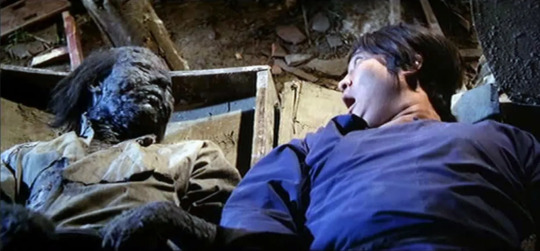
This review contains mild spoilers.
Encounter of the Spooky Kind is the deeply relatable story of a secretly cowardly man played by Sammo Hung who is being cheated on by his wife, so her lover decides that the best way to resolve the situation is to have him killed and goes to a magician, whose plan involves having Sammo stay at a scary old house where he’s supposed to get killed by a hopping vampire, but Sammo gets some nice tips from a good magician and manages to mostly avoid and then eventually kung fu fight the hopping vampire, so the lover decides to frame Sammo for the murder of the wife, and the one guy who can speak in Sammo’s defense had a stroke while everybody else testifies against him, so Sammo gets arrested by by Lam Ching-Ying ends up having to break out prison and ends up kung fu fighting a maggoty zombie right after, and then Sammo gets saved again from Lam by the good magician and then becomes his disciple, and the two of them go to fight the lover and the evil magician, and the two magicians argue over who has the bigger altar, and then there’s surprisingly bloody kung fu fight and then a really tasteless conclusion. What I’m saying is, it could happen to anybody.
This is a movie directed by and starring Sammo Hung. As an actor, here and elsewhere he brings a likable, dopey and self-deprecating presence that perhaps counters some of the less tasteful elements in the movie. To take a few examples, think of how hard it is to hate Sammo in Skinny Tiger, Fatty Dragon despite the scenes of him groping suspects, or how hard it is to hate Sammo in My Lucky Stars despite the agonizingly long scene where he and the other Lucky Stars scheme to grope the only major female character... jeez, there’s a lot of groping in these movies. Good thing Sammo is supernaturally likable. He’s also, despite the numerous jokes at the expense of his girth (his character is named “Big Guts”, although characters claim not very convincingly that it refers to his bravery), supernaturally gifted as a physical performer. Although if you compare him to Jackie Chan, another supernaturally gifted physical performer with whom he collaborated frequently, you can distinguish their particular comic presences. Jackie in Sammo’s movies is allowed to be cool, and in his own movies is hapless but somewhat dignified, like Buster Keaton. Sammo never gets to be cool in Chan’s movies, and here, he actually brings to mind Lou Costello with his over-the-top fearful reactions.
Which means that as a horror comedy, this invites comparison to Abbott & Costello Meet Frankenstein, in that it treats the horror elements with some degree of straightfacedness despite situating a comedy within these elements. Supposedly spooky stuff happens, but the joke isn’t that the spooky stuff itself is funny, it’s how Sammo reacts to it. This is an early hopping vampire movie and precedes the one I’m most familiar with, Mr. Vampire. Now, my memory of that is a little hazy, but while the latter movie is certainly packed with action and comedy, this one seems more interested in the aesthetics of horror movies. You can see this from the opening sequence, which takes the usually heavily stylized training sequences that usually open these movies and drapes it in dark colours and throws in spooky monsters instead of the usual poor bastards who get their asses kicked in these scenes. And then all the scenes where Sammo encounters hopping vampires, zombies and other supernatural forces, shot in atmospheric blue lighting.
So you get all this spooky stuff and all this funny stuff, but because this is a Hong Kong action movie from the ‘80s directed by Hung, you also get one great set piece after another. There’s a certain frisson you get from the dissonance between the meticulousness of the direction and choreography and the sheer silliness of what’s being depicted, that seems so bountiful in Hong Kong action comedies but seems so rare elsewhere. Any weekend where I put on a movie with Sammo or his friends is a good one. If anything, these scenes are so frequent and consistent that the effect becomes a little numbing, but as I alluded to earlier, the final confrontation ramps up the brutality and chases it with a shockingly tasteless punchline. Meaning that the movie ends on...maybe not a high note, but certainly an exclamation mark.
2 notes
·
View notes
Text
Picks of the Week - May 3, 2023
Did those April Showers bring May Flowers? A line up of activities certainly bloomed in this picks of the week
Musical: Royal City Musical Theatre presents its 31st Season bringing the Gershwin comedy musical Crazy for You, starring Todd Talbot (Love it or List it-Vancouver) to the Massey Theatre from April 27 – May 14.
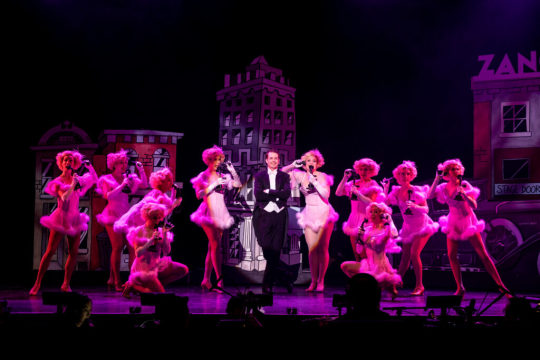
Todd Talbot in RCMT's Crazy For You
Photo: Moonrider Productions, Mark Halliday
Blooms: The Fraser Valley’s annual cavalcade of colour continues to bloom for the next few weeks, the 17th annual edition of the Chilliwack Tulip Festival covers acres of flowers
Festival: Continuing until May 28th, Urban Ink and The Cultch welcome new works and past favourites to a free, all-digital TRANSFORM Cabaret Festival focuses on empowering Indigenous artists and encouraging collaboration with non-Indigenous artists.
Legend: When an Elvis impersonator finds career troubles, he finds a new way to make ends meet, The Legend of Georgia McBride brings a banquet of fabulous outfits, fierce performances, and epic drag anthems to the Arts Club Stanley Industrial Alliance Stage until May 21st
Opera: Closing out its 2022-23 season, Vancouver Opera brings Wagner’s epic opera, The Flying Dutchman with two more performances, May 4 and May 7, at the Queen Elizabeth Theatre.
Improvise: The Improv Centre on Granville Island debuts its spring show, Bring Back The ‘90s!, on Fridays and Saturdays at 7:30pm until May 27
Femme: The Cultch’s continuing Femme Festival, features seven performances from women in music, theatre, dance, comedy, and circus, on its three stages with Body Parts and útszan (to make better) coming to the stage this week.
Choir: Chor Leoni and its star ensemble The Leonids prepare for a busy month of music, beginning with its May 5th Schubertiad collaboration with Early Music Vancouver.

The Leonids in The Turning (left to right):Eric Alatorre, Jacob Perry Jr., Steven
Soph, Enrico Lagasca, Erick Lichte, Steven Caldicott Wilson, Dann Coakwell,
Jonathan Woody, Andrew Fuchs, Sam Kreidenweis. Photo: David Cooper.
Project: Pi Theatre, adds a touch of intrigue to its next production. Continuing its Provocateurs Series with the next presentation, Untitled Peter Tripp Project, running from May 4 - 6 at a secret location which will be announced to ticket holders days before the performance.
Balls: Hoping to make it an unbeaten in 8 MLS matched, Whitecaps FC take the field at BC Place to host Minnesota United FC, Saturday at 7:30pm
Futures: Until January 14, 2024, 25 years since the artist’s passing, the Bill Reid Gallery presents the Canadian premiere exhibition of Bright Futures, co-curated by Bill Reid Gallery Curator Beth Carter, Assistant Curator Aliya Boubard, and in consultation with Jordan Wilson (Musqueam).
Quintet: Saturday May 6th, New Westminster's Anvil Centre presents Huu Bac Quintet's, Mekong Waters, a skilful fusing of the traditional sounds of his Vietnamese and Chinese heritages with North-American jazz.
Huu Bac Quartet at Anvil Centre Saturday May 6th.
Photo: Johanna Katrina
Comedy: Running to May 7, The Firehall Arts Centre and Savage Society present the remount of Taran Kootenhayoo’s White Noise, a comedy about two families who have dinner together for the first time during Truth and Reconciliation week.
Exhibition: On display until June 11, Richmond Art Gallery, in partnership with the Richmond Public Library, presents A Small but Comfy House and Maybe a Dog the first major solo exhibition by Amy Ching-Yan Lam, guest curated by Su-Ying Lee, featuring sculptures made in collaboration with HaeAhn Woo Kwon, with objects from the collections of the Gallery and the neighbouring Richmond Public Library.
Gallery: On display until May 14, Polygon Gallery presents As We Rise: Photography from the Black Atlantic Curated by Elliott Ramsey, the exhibition is organized by Aperture and features more than 100 photographs from the Wedge Collection — Canada’s largest privately owned collection committed to championing Black artists.
Read the full article
0 notes
Photo

Lam Ching-ying as Master Kau, the One-Eyebrow Priest, aka Mr. Vampire, in a promo still for one of the several Mr. Vampire sequels.
If you are only familiar with jiangshi, the Chinese hopping vampires, from various manga and anime, you owe it to yourself to see these films. Mr. Vampire (1985) is the film that popularized the genre, and introduced most of the tropes that come with it.
Mr. Vampire is hilarious and fun. The sequels - Mr. Vampire ll, lll, and lV - are fun as well, but be warned they are only sequels in the “spiritual” sense. They share the same theme of battling jiangshi, and use much of the same cast (though playing different roles), however, they can almost be considered stand-alone films.
The only true sequel is Mr. Vampire 1992, which reunites the original cast in their original roles, and picks up the story immediately after the end of the first Mr. Vampire.
Lam Ching-ying was an accomplished actor and martial artist, with a long list of credits. However, after the tremendous success he became type-cast as a unibrowed Taoist. Unlike other actors, though, Lam embraced this wholeheartedly. He starred in numerous other jiangshi and horror comedies, and even directed himself in a few, including the very entertaining Vampire vs. Vampire (1989).
Lam was starring in a Mr. Vampire-inspired television series, Vampire Expert, in the mid-1990s when he, sadly, developed liver cancer and passed away at the age of 49.
#Mr. Vampire#Master Kau#One-Eyebrow Priest#Lam Ching-ying#jiangshi#Chinese vampire#hopping vampire#Hong Kong films
17 notes
·
View notes
Text
The Dead and the Deadly - film review The Dead and the Deadly
The Dead and the Deadly – film review The Dead and the Deadly
Os Mortos e o Assassino (1982)Diretor: Wu MaElenco: Sammo Hung, Lam Ching Ying, Cherry Chung,Idioma: Cantonês (com legendas opcionais em inglês ou dublagem em inglês)Duração: 139 minutosFormato: BlurayData de lançamento: 21 de novembro de 2022
Jimmy Haflin assiste a uma comédia sobrenatural de artes marciais de Hong Kong, estrelada pelo lendário Sammo Hung.
Reunindo vários jogadores importantes…
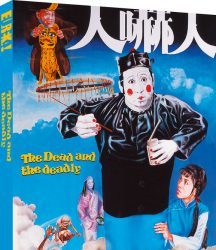
View On WordPress
0 notes